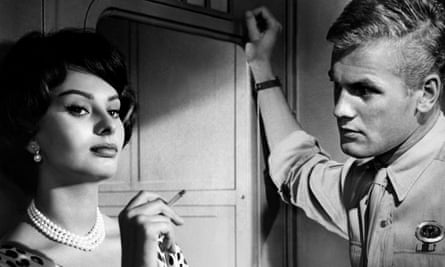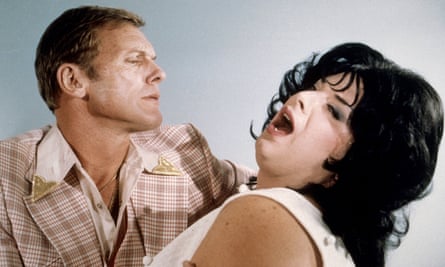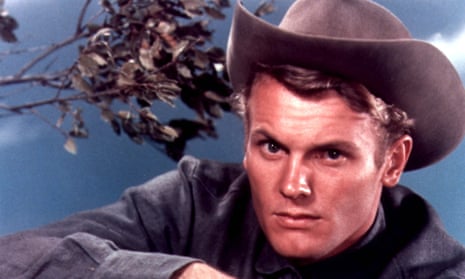“He had a face that was so handsome that it didn’t look real. He could have been a composite man created by God … or the devil!”, remarked George Abbott, the director of the musical Damn Yankees (1958), describing Tab Hunter, who played the role of the baseball player who sells his soul to the devil. Hunter, who has died aged 86, was the bronzed, blond pin-up boy of 1950s Hollywood, a paradigm of clean-cut American youth whom teenage girls wanted to date and whom they would be pleased to take home to mother.
At the same time, Hunter was having a clandestine relationship with Anthony Perkins, another Hollywood “dreamboat” of the 50s. Such was the homophobia in Hollywood at that time – a microcosm of prevalent views in the US – that the revelation of such a liaison would have been like a large boulder pitched at the glass facade of the dream factory, shattering the entire edifice.
Hunter was only a year older than Perkins, but had made it in films a few years earlier. However, their careers were congruent in some ways: both made films with Sophia Loren at Paramount; and both dated Gary Cooper’s daughter, Maria, and other young women, for publicity purposes. They even played a couple of the same roles: in the musical Damn Yankees, Hunter on screen, Perkins on stage; and as the baseball hero Jim Piersall in Fear Strikes Out, Hunter on TV, Perkins in the movies.

Hunter was born Arthur Kelm in New York City, the younger of two sons of Charles Kelm and Gertrude Gelien. (His older brother was killed in Vietnam in 1965.) His mother was a German Roman Catholic immigrant, and his father was Jewish. Following his parents’ divorce, his mother moved the children to California to get away from her abusive husband, and they took her maiden surname.
At 15, young Arthur ran away from home to join the US Coast Guard, lying about his age. He was not discharged until almost a year later, when the deception was discovered. On his return home, he took a job at a riding academy. But an introduction to the actors’ agent Henry Willson changed his life. Willson had an eye for good-looking men whom he would rename and get into films, sometimes in return for sexual favours. It was Willson who turned Roy Fitzgerald into Rock Hudson, Robert Mosely into Guy Madison, Merle Johnson Jr into Troy Donahue, Francis McCown into Rory Calhoun and Arthur Gelien into Tab Hunter.
Without any drama lessons or acting experience, Hunter made his film debut in a bit part in Joseph Losey’s social drama The Lawless (1950). However, he shot to stardom with his second film, Island of Desire (1952), in which he and Linda Darnell appeared in a state of decorous undress on a desert island. He followed this with juvenile leads in three B-movies, his acting increasing in confidence with each one – The Steel Lady (1953), Gun Belt (1953) and Return to Treasure Island (1954) – before gaining a lucrative contract with Warner Bros, and meatier roles.

The first of these was in William Wellman’s Track of the Cat (1954) as Robert Mitchum’s younger, sensitive brother, in a film celebrated for its low-key cinematography, in which Mitchum’s red jacket and Tab’s blond mop stood out against the white, snowy background. Hunter also stood out in Raoul Walsh’s Battle Cry (1955), as an idealistic recruit who is seduced by a lonely navy wife (Dorothy Malone).
Everything was done to get the teen idol to expose what were called his “beefcake” charms – here he has to shed his uniform, made itchy because of straw from a hayride, and replace it with swimming trunks. In The Sea Chase (1955), as a German sailor, he goes swimming with his best friend (Richard Davalos), who gets bitten by a shark, and then has a touching scene at the dying boy’s bedside.
Hunter’s popularity survived despite the story that had pursued him since he started out in film. In October 1950, he had been arrested with others after a gay pyjama party in Beverly Hills, an incident that was reported in the press. He claimed in public that he was there out of naivety, and had no idea what kind of party it was. He was eventually fined $50 for a reduced “disorderly conduct” charge, having originally been charged with “idle, lewd or dissolute conduct”.
In a 1955 article, the scandal sheet Confidential dragged the story out again, calling him one of Hollywood’s “limp-wristed lads” and noting his presence at a “swish party” attended by “two dozen of the gayest guys the vice squad has ever seen”. Libel and obscenity charges were successfully brought against the magazine, and Hunter’s career did not suffer.
In 1956, he was teamed up for two films with the 18-year-old Natalie Wood. The Burning Hills was a western, a genre in which it was rare to cast two bright young things, but the studio hoped that it would entice teenagers away from their TV sets. Consequently, Hunter took off his shirt, and Wood put on a Mexican accent. In The Girl He Left Behind, a rather lame service comedy, Wood played the title role, while Hunter was a reluctant draftee.
In uniform again, he was the soldier for whom Loren falls in the soap opera That Kind of Woman (1959). Before that, in Damn Yankees, Hunter was the crew-cut baseball player vamped by the devil’s handmaiden (Gwen Verdon). He did a number with Verdon, Two Lost Souls, in which he sang adequately but left the more strenuous dancing to her.
In 1957, Hunter had topped the charts for over a month with Young Love and had other hit singles as well. Nicknamed the “sigh guy”, his popularity was such that in 1960 he was given his own TV sitcom, The Tab Hunter Show, which ran for a year. It cast him as a girl-chasing cartoonist drawing a comic strip series called Bachelor-at-Large, based on the cartoonist’s own romantic entanglements. Each episode featured a new conquest.
In 1964, he appeared on Broadway in Tony Richardson’s production of Tennessee Williams’s The Milk Train Doesn’t Stop Here Anymore, in which he played the part of a young poet who has an affair with an ageing millionairess (played by the formidable Tallulah Bankhead). However, the combination was not enough to carry the play over more than a few nights.
The movies he made in the 60s were a pretty mediocre bunch, though films such as Ride the Wild Surf (1964) still exploited his beach boy looks. But he was among a group of actors whose boyish good looks had played a big part in their success, such as Donahue, Farley Granger, Jeffrey Hunter, Sal Mineo and John Derek, and found that their careers withered with middle age.
Hunter, now forced to take the few character roles that came his way during the 70s, survived by guest-starring in television series. In the 80s, he re-emerged as a camp icon thanks to the film-maker John Waters, who offered him the role of Todd Tomorrow, the lover of Francine Fishpaw (played by the drag queen Divine) in Polyester (1981). Hunter, playing it straight, was effective, as was his underplaying in Lust in the Dust (1985), a crude spoof western, in which he was a silent gunslinger with no name opposite Divine as a saloon singer. Lust in the Dust was co-produced by Hunter and Allan Glaser, the partner with whom he had lived since the early 80s, and who survives him.
In 2005, Hunter came out officially with his Hollywood memoir, Tab Hunter Confidential: The Making of a Movie Star, in which he mentioned past lovers such as Perkins and the dancer Rudolf Nureyev. He wrote the book, he claimed, because, “it is better to get it from the horse’s mouth than the horse’s ass”. A documentary inspired by the book, which featured interviews with Hunter and his friends and co-stars, was released in 2015.

Comments (…)
Sign in or create your Guardian account to join the discussion